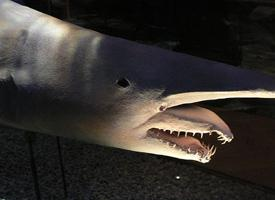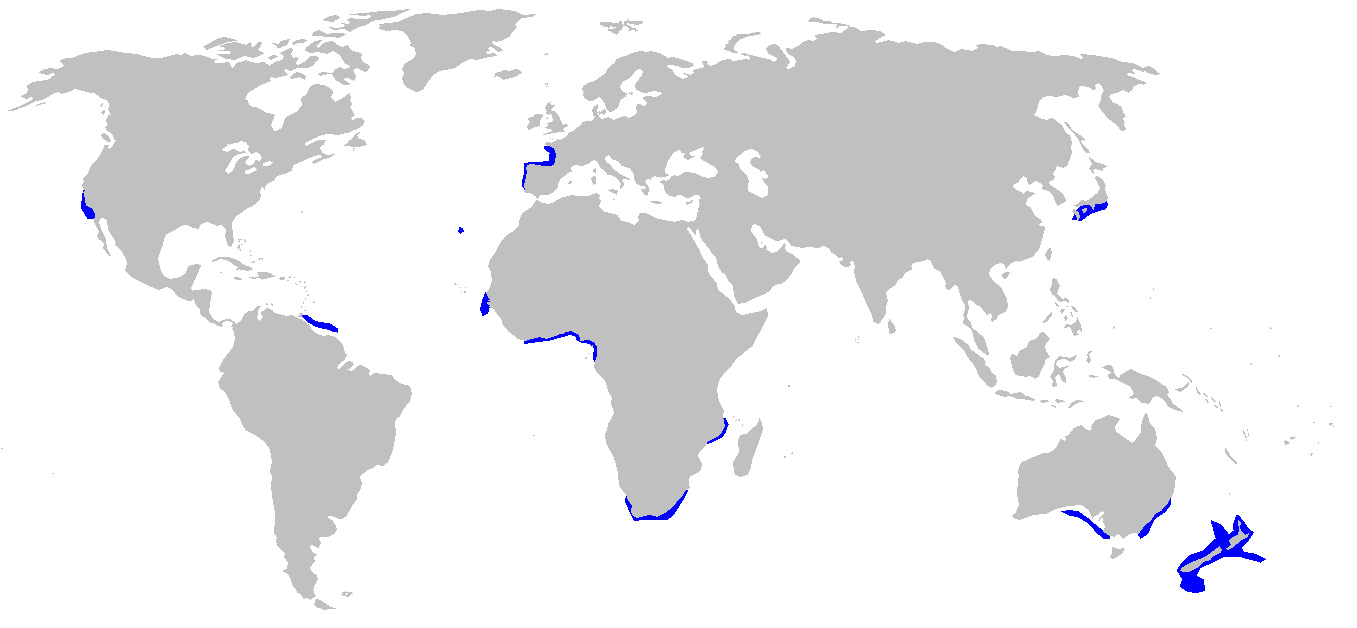
Descrierea animalului
The Goblin shark (Mitsukurina owstoni) is a rare and enigmatic species of deep-sea shark, often considered a living fossil due to its primitive features and lineage that dates back some 125 million years. This species is the sole surviving member of the family Mitsukurinidae, a lineage that has otherwise vanished from the Earth's oceans. The Goblin shark is found in scattered locations around the world, typically in deep waters off continental shelves and submarine canyons, ranging from the Atlantic, Pacific, and Indian Oceans.One of the most distinctive features of the Goblin shark is its peculiar and somewhat unsettling appearance, which has earned it its name. The shark's profile is dominated by its long, flattened snout, which is much longer than any other shark species relative to its body size. This snout is packed with electrosensitive organs that help the shark detect the electric fields of prey animals in the deep, dark waters it inhabits. Following the snout, the Goblin shark's jaws are highly protrusible, capable of extending forward to snap up prey in a manner reminiscent of some science-fiction monster. This unique feeding mechanism is supported by a set of needle-like teeth in the front for gripping, and flatter teeth at the back for crushing.
The coloration of the Goblin shark is another notable feature, often described as a pinkish-gray hue. The pink coloration is thought to come from visible blood vessels beneath a semi-transparent skin, a characteristic that likely helps in camouflage in its deep-sea environment. This shark's body is soft and flabby, suggesting a slow-moving nature, with small fins relative to its body size, including small pectoral fins and a dorsal fin set far back towards the tail.
Adult Goblin sharks typically range in size from 3 to 4 meters (10 to 13 feet) in length, though larger specimens exceeding 6 meters (20 feet) have been reported. However, due to the depths at which they live, ranging from 300 to 1,300 meters (1,000 to 4,300 feet), sightings are rare and much of their behavior and ecology remain a mystery. It is believed that they are solitary animals, coming together only to mate, and their diet likely consists of a variety of deep-sea creatures, including fish, cephalopods, and crustaceans.
The reproductive habits of the Goblin shark are largely unknown, but like many sharks, they are thought to be ovoviviparous, meaning the eggs develop and hatch inside the female's body, with the young born live. Due to their deep-sea habitat and rare sightings, Goblin sharks are listed as "Least Concern" by the International Union for Conservation of Nature (IUCN), but like many deep-sea creatures, they could be vulnerable to the impacts of deep-sea fishing and habitat destruction.
In summary, the Goblin shark is a fascinating and mysterious creature, a relic of ancient times that continues to capture the imagination of scientists and the public alike. Its unique adaptations and appearance make it a standout among the diverse and often strange species that inhabit the world's oceans
Harta răspândirii

Fotografii noi cu animale
Top 10 animale
- Dolphin gull (Leucophaeus scoresbii)
- Diana monkey (Cercopithecus diana)
- Moustached guenon (Cercopithecus cephus)
- Greek tortoise (Testudo graeca)
- Stone loach (Barbatula barbatula)
- Galápagos tortoise (Geochelone nigra complex)
- Japanese macaque (Macaca fuscata)
- Russian tortoise (Testudo horsfieldii)
- Common flying dragon (Draco volans)
- Galápagos penguin (Spheniscus mendiculus)